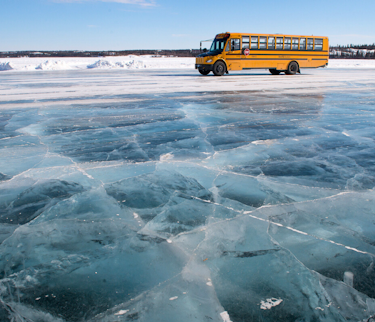Awareness French Conference on Franco-Ténois Culture through Images and Stories
An introduction to Franco-Ténois culture and life in a northern minority context.
Free
Our cookies and those of our partners help improve your experience and analyze your use of the website. To learn all about cookies, check our privacy policy

In Yukon, the Northwest Territories, and Nunavut, winter shapes daily life. For early childhood educators, going outside is not simply an activity — it is an educational act rooted in northern reality. At Collège Nordique in Yellowknife, this philosophy guides early childhood education: understanding the North also means learning with the North.
Canadian and international research agrees: free outdoor play, even in cold weather, is a vital driver of holistic child development. It supports motor skills, confidence, emotional regulation, and physical health — all fundamental competencies in the early years (Lee et al., 2025; World Health Organization, 2020).
Educators in Yukon draw inspiration from land-based education, which considers the land as the first teacher. They also benefit from a concrete resource — the Forest School Guide for Parents – Commission scolaire francophone du Yukon (CSFY). This guide introduces parents to the philosophy of forest school, an approach focused on free play, curiosity, and connection to nature. It encourages children to learn through exploration and discovery of the territory, while respecting their rhythm and safety.
In Yellowknife, Collège Nordique supports educators in adapting pedagogy to northern realities: short days, extreme cold, wind, and isolation. Training emphasizes safe planning, beneficial risk management, and integrating free play into daily routines. Educators learn to turn climatic challenges into learning opportunities, for example, by documenting emotions felt outdoors or observing shifting daylight as both a scientific and reflective exercise.
In Inuit communities, the connection to the land is central to child development.
According to Statistics Canada (2020), nearly 40% of Inuit children aged 2 to 5 play outside daily, even when temperatures drop far below zero. Educators build on traditional knowledge: sharing stories about the wind, tracking Arctic hares, observing how the sky changes. Harsh conditions call for shorter but more frequent outings, flexible planning, and close attention to safety. These practices make Nunavut a model of pedagogical adaptation — teaching by the land and for the land.
Letting a child slide, climb, or explore safely is an opportunity to learn boundaries. The Canadian Paediatric Society (2024) reminds us that avoiding risk often limits learning.
In the North, this philosophy takes on special meaning: the ground is uneven, the weather unpredictable — and within that complexity, children learn prudence, cooperation, and self-confidence.
The approach of Collège Nordique is part of a Canada-wide movement supported by partners such as the Lawson Foundation, territorial governments, and northern postsecondary institutions. The goal is to develop education rooted in the land, responsive to northern climates and cultures.
Outdoor free play becomes a threefold tool:
In northern Canada, cold is not an obstacle — it is raw material for learning, growth, and fulfillment. And in Yellowknife, Collège Nordique has made it a cornerstone of its mission: to train educators who teach the North, in the North, and for the North.
Published October 29, 2025
Loading
Thank you for subscribing